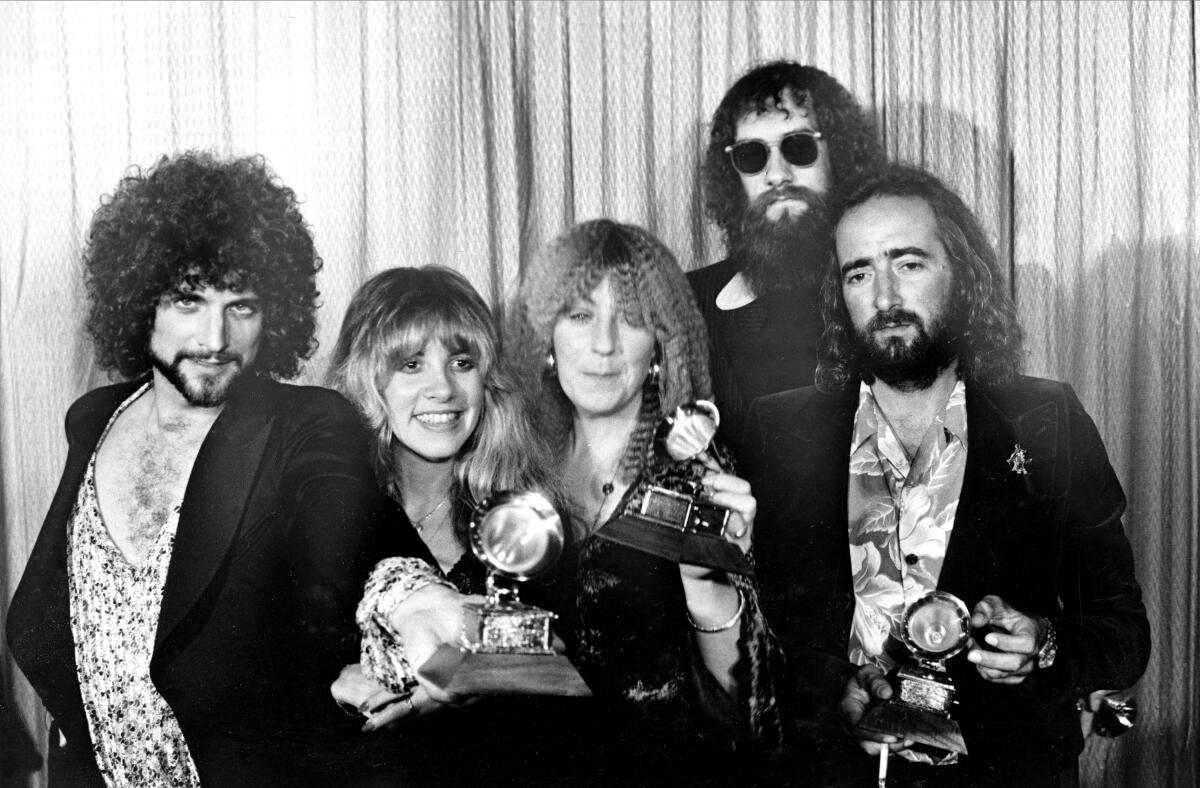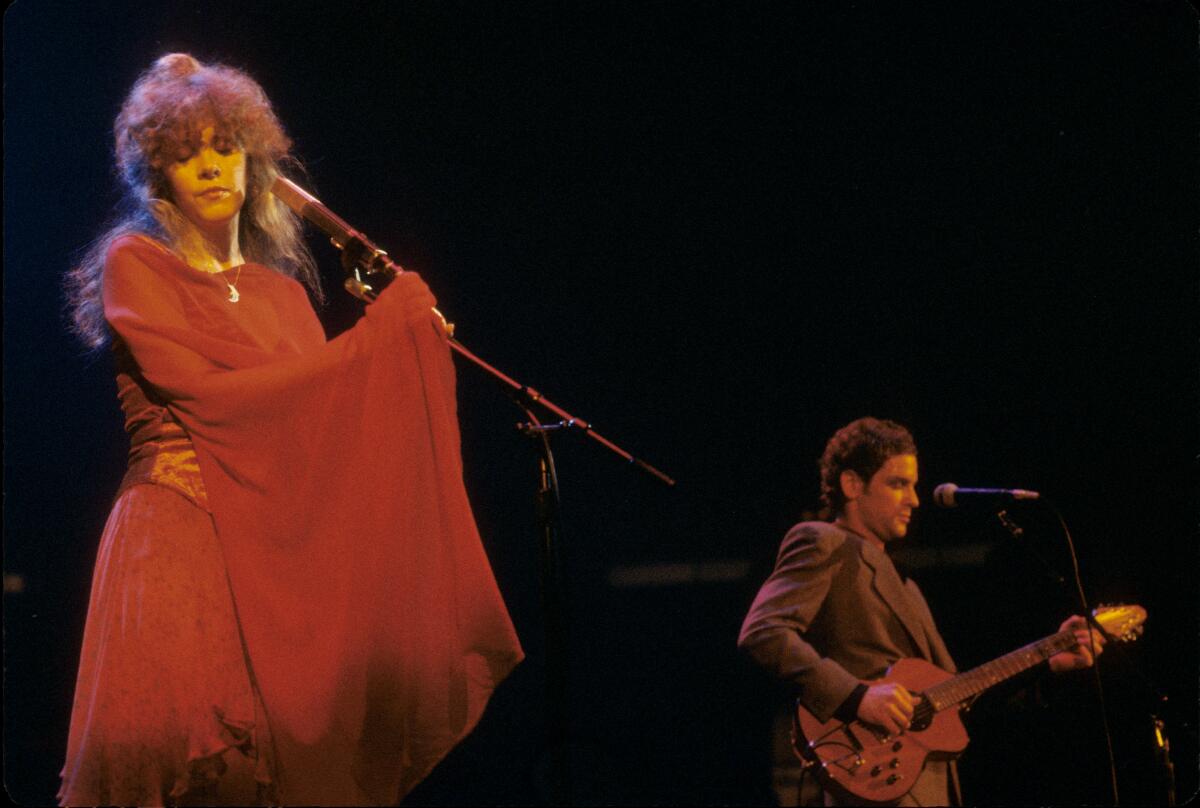
Somebody should write a song about the romantic drama that’s gone down over the years between Lindsey Buckingham and Steve Nicks.
But of course, both of them already did: Fleetwood Mac’s “Dreams,” written by her, and “Go Your Own Way,” written by him, to name only two songs about their tumultuous relationship.
Their complicated dynamic is back in the spotlight this week following Buckingham’s new Los Angeles Times interview, and the details can’t be summed up in any four-minute single. So read on for highlights and lowlights from one of rock’s most storied relationships.
The early years
Buckingham and Nicks met as high school seniors near Palo Alto, Calif., in the late 1960s. He was in a psychedelic rock band, Fritz, and asked her to join it as lead singer after two members left to go to college. At this point they were mutually interested in music but weren’t yet romantically involved.
Fritz stayed together until the early 1970s, with Nicks and Buckingham dating other people the entire time. By the time the two decided they were moving to L.A., the band had broken up, and Nicks and Buckingham were suddenly a romantic item.
“I’m not sure we would have even become a couple if it wasn’t for us leaving that band. It kind of pushed us together,” Nicks would later say, according to Stephen Davis’ biography of her, “Gold Dust Woman.”
But Buckingham got mononucleosis, which delayed their L.A. sojourn by the better part of a year, during which Nicks took care of him and the two continued to grow musically.
Moving to L.A.
When they finally hit the City of Angels in late 1972, “They were immediately perceived as a sexy, star-bound couple. People who encountered them recall an aura about them, a radiance,” Davis wrote. “They were Mr. and Mrs. Intense, he in his curly locks and icy blue eyes and she in her long straight hair and her piercing gaze when you talked to her.”
In the star-filled atmosphere of early-’70s Los Angeles, they teamed up as a folk-rock duo called Buckingham Nicks, releasing an eponymous album in late 1973. Despite the album cover’s iconic photo of them topless, the record flopped and the label dropped them.
They had begun to fight, and money was tight, but the music making didn’t stop — with the beginnings of later hits “Rhiannon” and “Landslide” among the fruits of their labors. But the two were clashing. Nicks was exhausted from waitressing and cleaning houses to make ends meet. Buckingham had gone out on a tour with Don Everly that had ended badly.
Joining Fleetwood Mac

On the last day of 1974, having recently moved to L.A. and down a few members, Fleetwood Mac — consisting then of Mick Fleetwood, John McVie and Christine McVie — came across Buckingham at a studio. Fleetwood wanted his guitar skills in the group. Advised in advance that Buckingham and Nicks were a package deal, he asked them both to join.
The duo took a few days to decide. Buckingham was ambivalent, apparently, considering Fleetwood Mac to be a meat grinder that ran through band members. The British-American group’s sound was markedly different — rooted in the blues and anchored by Peter Green — before Nicks and Buckingham signed on.
“I said, OK, this is what we’ve been working for since 1968,” Nicks told Buckingham, according to “Gold Dust Woman.” “And so, Lindsey, you and I have to sew this relationship back up. We have too much to lose here. We need to put our problems behind us. Maybe we’re not going to have any more problems, because we’re finally going to have some money. And I won’t have to be a f— waitress.”
Everyone wound up going out to dinner, and the deal was sealed.
The breakup(s)
While writing and recording the album “Rumours,” which was released early in 1977, Buckingham and Nicks ended their love affair. Band members John and Christine McVie, who had been married since 1968, also broke up. Mick Fleetwood’s divorce was almost final too, though he would go on to remarry Jenny Boyd in 1977 and re-divorce her in 1978.
It was from that cauldron of discontent that songs like “Dreams” and “Go Your Own Way” emerged, much to fans’ delight. “Rumours,” which won a handful of Grammy Awards, remains one of the bestselling albums of all time.
“I think one day John and I will write a book on what’s gone down,” Fleetwood told The Times’ Robert Hilburn in 1976. “The only problem is that no one will believe us.”
Moving on
“In Lindsey’s mind, all the other women that came after me were all going after rich rock-and-roll star Lindsey,” Nicks once told Rolling Stone. “Nobody was looking into the heart I had looked into. Nobody was seeing the guy before he was famous. We knew each other before. That’s what makes us unique to each other.”
Nicks had a short-lived affair with Fleetwood in 1977 (yes, during his second marriage). Buckingham, meanwhile, embarked on an eight-year relationship with Carol Ann Harris. Though he and Harris got engaged, they never married.
Fleetwood told Hilburn in 1976 that it was “an unusual situation” for a band to stay together after so many splits among its members. But things seemed to be working out OK.
“When we walk up on a stage, the band is very close …,” Fleetwood said at the time. “There are lots of bands who detest each other. We’re not one of those.”
Learning to live with it
The band went on, of course, though over the years — as Nicks told The Times last year — Buckingham and Nicks “shot eye daggers at each other” in front of packed stadiums during renditions of breakup anthems such as “Silver Springs.” That song, written by Nicks, had been intended for “Rumours” but wound up as the B-side of the “Go Your Own Way” single. Sample lyrics: “So I’ll begin not to love you / Turn around, you’ll see me runnin’ / I’ll say I loved you years ago / And tell myself you never loved me, no.”
Nicks went on to date musicians Don Henley, J.D. Souther and Joe Walsh, all of whom were affiliated with the Eagles, another red-hot band in the 1970s and ’80s. She was married in 1983, very briefly, to Kim Anderson, the widower of her best friend who had just died, but never had kids of her own. She has said she makes do with her niece and godchildren.
Buckingham, who broke up with Harris in 1984, had a son with photographer and interior designer Kristen Messner in 1998. They got married in 2000 and went on to welcome two daughters.
Moving on again, career-wise

In the 1980s, Buckingham started releasing solo albums, preferring the studio to touring. He left Fleetwood Mac in the late 1980s and stayed away for a decade. Nicks followed him through the exit door a few years later and was already working on her solo career, which yielded the hits “Edge of Seventeen,” “Stand Back” and “Stop Draggin’ My Heart Around” (with Tom Petty and the Heartbreakers).
But they both eventually came back to the Mac. And why not, when Fleetwood Mac tours would regularly gross hundreds of millions of dollars?
The final breakup
In early 2018, with the band’s tour schedule already sketched out, Buckingham asked for a three-month delay so he could promote his solo work. While the rest of the group was flexible, he said, Nicks was firm: The dates were the dates and they weren’t changing.
Tension was high that January, with the former lovers trading jabs — and Buckingham rolling his eyes during Nicks’ extended speech — after picking up the MusiCares Person of the Year award.
“Ironically,” Buckingham recently told The Times’ Amy Kaufman, “nothing went down that night that was [as contentious] as the stuff we’d been through for 43 years.”
But it led to the apparent final split between Buckingham and Nicks: Soon after that night, he was fired from the band. He later sued for millions, with the lawsuit settled by the end of 2018. Nicks has said in the time since the breakup that she did not have her former partner fired.
In 2019, Buckingham had a heart attack and underwent bypass surgery. He said recently that he did hear from Nicks after that and has emailed and texted her, but she rarely responds.
The pandemic
The threat of contracting COVID-19 has been crippling for Nicks, who has said she fears going on a ventilator would leave her hoarse and ruin her voice. The vaccinated singer has been cloistered at home, and just last month canceled the five shows she had planned for 2021.
“Because singing and performing have been my whole life, my primary goal is to keep healthy so I can continue singing for the next decade or longer,” she tweeted last month.
Meanwhile, after Buckingham spent recent years focused primarily on recovery from his heart issues, his wife filed for divorce after 21 years of marriage — and just days after the musician’s early June announcement of a new solo album and 30-date solo tour.
“I’ll tell you what: Between the Fleetwood Mac stuff and the heart attack, it’s all been humbling,” he told The Times. “I’ve never suffered from a lack of confidence, and sometimes could get carried away with that in the process of leading the band. But everything has pulled me in a little bit. I’m not as aggressive a person as I was before, which is probably not a bad thing. It made me look around more — and become less self-involved, hopefully.”
Buckingham said he was disappointed that nobody in the band — which he says he’d like to rejoin someday, if Nicks would allow it — stood up for him during that last fight.
But he understood.
“It would be like a scenario where Mick Jagger says, ‘Either Keith [Richards] goes or I go,’” he told The Times. “No, neither one of you can go. But I guess the singer has to stay.
“The figurehead,” he said, “has to stay.”